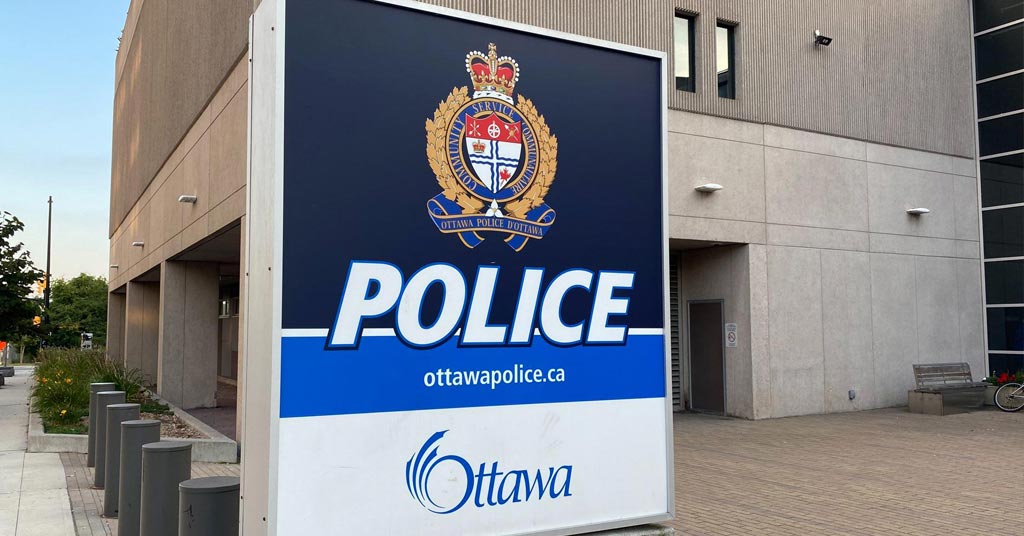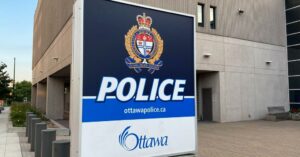
Ottawa’s Police Board is Facing a Constitutional Challenge Over ‘Strict’ Rules Limiting Speakers at Public Meetings
Community groups accuse civilian police board of violating Charter Rights and ‘chilling’ free speech
Ottawa’s Police Services Board is being accused of violating the charter rights of local residents in a new lawsuit over controversial by-laws adopted by the civilian police oversight body earlier this year, changes community groups say limits public participation and silences critics.
The lawsuit, which is being brought forward on behalf of several community groups and local residents – including advocacy groups that focus on anti-Black racism, such as 613-819 Black Hub and the Black Student Leader’s Association – accuses the Ottawa Police Services Board of using sneaky procedural rules to keep critical voices away from police board meetings.
In January, the police board’s policy and governance committee, which includes Ottawa Mayor Mark Sutcliffe, recommended several changes to the board’s public consultations procedures that sought to place numerous limits on delegations speaking at police board meetings.
Those changes, which were approved in February, require speakers to submit comments in writing for the police board to review and approve in advance of each police board meeting.
Speakers may only speak on pre-approved topics and are forbidden from speaking “disrespectfully” about Ottawa Police and police board members.
A Statement of Claim filed on behalf of residents and community groups argues these changes were made to insulate Ottawa Police and the Ottawa Police Services Board from criticism.
The lawsuit argues the police board’s changes violate sections 2(b) and (c) of the Charter of Rights and Freedoms: Freedom of expression and freedom of association.
“The Plaintiffs state that the actions of the Defendant diminish democratic discussion and debate in a manner inconsistent with the Board’s mandate and contrary to the state authority to limit free expression in a free and democratic society,” the statement of claim says.
The residents and community groups describe the police board’s move to hive off public speakers from the board’s official meetings as “window dressing” that has “effectively separated meaningful public discussion from the deliberative process of the Board.”
They also argue that the police board’s rules vetting presenters that “criticize either the Board or the OPS” represent a “form of censorship of speech.”
In a statement to PressProgress, police board chair Gail Beck said the OPSB has retained legal counsel and plans to file a defence, but will “not be commenting on the specifics of the legal action as it is before the courts.”
Beck, who noted the bylaw changes pre-date her time on the board, said the rules were brought in to “ensure the procedures around delegations were assisting the board in performing its governance and oversight responsibilities.”
“The procedures now require members of the public to submit their comments in writing in advance of the meeting which helps to ensure the topic of the delegation is appropriate for the mandate of the board,” Beck said, adding this “also provides the board members an opportunity to reflect on the feedback being provided.”
But Robin Browne, 613-819 Black Hub coordinator and one of several plaintiffs in the lawsuit, alleges in court documents that Beck is using that rule to find reasons to reject submissions and exclude critical voices from participating in police board meetings.
The Statement of Claim notes the police board blocked Browne from speaking at its June 2023 meeting because Beck reviewed Browne’s pre-meeting written submission and felt it was “inappropriate” that he included comments criticizing her for remarks she made about police and mental health during a radio interview on CBC Ottawa Morning.
The next month, Browne was again blocked from speaking after Beck ruled a written submission about Ottawa Police’s participation in a pilot project on mental health and addiction was off-topic for the police board – even though the Ottawa Police Service created the project.
“They just banned me outright,” Browne told PressProgress, adding the police board appears to be relying on “very subjective” interpretations of what is respectful or relevant and is forcing the public to “jump through hoops” just to get a chance to speak.
“The last three months, there’s been no delegations,” Browne said. “Before that it was just me because I managed to get through, then the last three there’s been no delegations – they’ve been successful in completely eliminating public delegations.”
“98% of the delegates are critical of the police,” Browne said. “You can see what that says about them restricting delegations.”
Sam Hersh, a director of Horizon Ottawa and another plaintiff in the constitutional challenge, says the police board began using procedural tactics and “strict” rules to manage and contain criticism following the 2020 police murder of George Floyd and later the fallout over Ottawa Police’s failures during the Freedom Convoy occupation.
“Since George Floyd, there’s been more people speaking at the meetings,” Hersh noted, adding that those numbers ballooned further after the convoy occupation.
“Right after the convoy, there was almost 100 people signed up, then (city councillor and former police board chair) Eli El-Chantiry postponed the meeting and then never had it until two months later,” Hersh said. “Only 10 or 15 people showed up.”
“The convoy really was the breaking point in a way, that’s when things started getting really bad in terms of making it difficult for people to speak out at the board meetings.”
Ottawa Police came under intense national scrutiny over its numerous policing failures that surfaced during the Freedom Convoy occupation.
The 2022 Emergencies Act Inquiry revealed internal breakdowns and infighting inside Ottawa Police enabled the Freedom Convoy occupation to spiral out of control.
Diane Deans, former chair of the Ottawa Police Services Board, testified that former Police Chief Peter Sloly, Ottawa’s first Black police chief, was dealing with an “insurrection from within” at the same time as he was dealing with violent convoy occupiers in the streets by factions inside the Ottawa Police Service opposed to reforms addressing systemic racism and racial profiling.
Deans was ousted from police board in the middle of the convoy after an intense backroom battle with former Ottawa Mayor Jim Watson on naming a replacement for Sloly. Deans was replaced by El-Chantiry, a Watson loyalist, who controversially hired a new police chief last fall.
A week before the arrival of the convoy, Ottawa Police released a workplace assessment that concluded workplace harassment, including sexist and racist discrimination, is widespread inside the Ottawa Police Service.
With Ottawa Police facing so many serious issues, Browne says the police board’s procedural rules limiting criticism and democratic debate go against its core role as a civilian oversight body.
“The board that’s supposed to be giving oversight is just a rubberstamp,” Browne said. “In fact, they’re more than that – they’re more like cheerleaders for the police.”
Read the full Statement of Claim:
PDF-2023-09-01
Our journalism is powered by readers like you.
We’re an award-winning non-profit news organization that covers topics like social and economic inequality, big business and labour, and right-wing extremism.
Help us build so we can bring to light stories that don’t get the attention they deserve from Canada’s big corporate media outlets.
Donate



